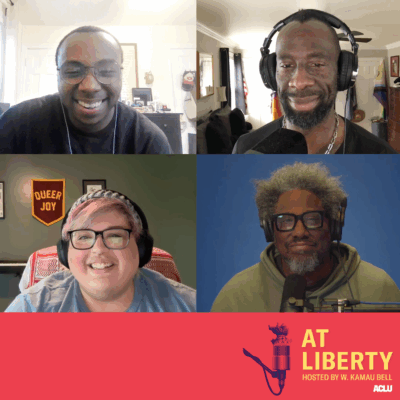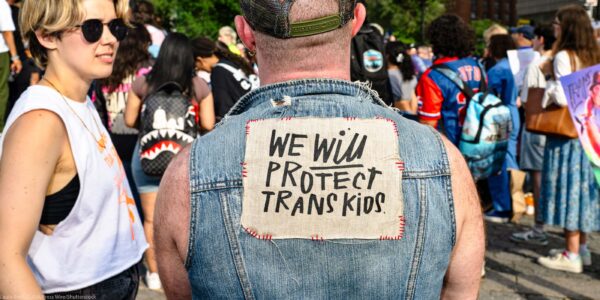
Who We Fight For: The Journey to Trans Liberation
June 20, 2025
This past weekend, an estimated 5 million folks across the country protested Trump's attack on our rights. And if you asked anyone in the crowd why they showed up—and who they showed up for—they’d likely have an answer. Today, W. Kamau Bell is joined by three activists—Ash Lazarus Orr and Stephen and Hobbes Chukumba—who are showing up for LGBTQIA+ rights. Listen in as they discuss how they’re navigating Trump’s escalating abuses of power, what trans rights have to do with reproductive and racial justice, and how they’re finding joy this Pride month.
A note from the At Liberty team: just after recording this episode, we received a ruling on U.S. v. Skrmetti. You can learn more about the decision, and the latest on Orr v. Trump, at :
/press-releases/aclu-lambda-legal-respond-to-supreme-court-ruling-in-u-s-v-skrmetti
This Episode Covers the Following Issues
Related Content
-
Press ReleaseJul 2025

LGBTQ Rights
Women's Rights
Supreme Court Will Hear Challenges To Bans On Athletic Participation By Transgender Students. Explore Press Release.Supreme Court Will Hear Challenges to Bans on Athletic Participation by Transgender Students
WASHINGTON – The Supreme Court today granted certiorari in two federal court cases involving transgender youth challenging bans on their participation in local school and college sports. “Like any other educational program, school athletic programs should be accessible for everyone regardless of their sex or transgender status. Trans kids play sports for the same reasons their peers do–to learn perseverance, dedication, teamwork, and to simply have fun with their friends,” said Joshua Block, Senior Counsel for the Ířşě±¬ÁĎ’s LGBTQ & HIV Project. “Categorically excluding kids from school sports just because they are transgender will only make our schools less safe and more hurtful places for all youth. We believe the lower courts were right to block these discriminatory laws, and we will continue to defend the freedom of all kids to play.” “Our client just wants to play sports with her friends and peers,” said Lambda Legal Senior Counsel Tara Borelli. “Everyone understands the value of participating in team athletics, for fitness, leadership, socialization, and myriad other benefits. The U.S. Court of Appeals for the Fourth Circuit last April issued a thoughtful and thorough ruling allowing B.P.J. to continue participating in track events. That well-reasoned decision should stand the test of time, and we stand ready to defend it.” Earlier this year, efforts to enact a national ban failed in the U.S. Congress. Since 2020, 27 states have banned transgender youth from playing school sports. Many of these bans allow for invasive forms of sex testing that put all female student athletes at risk and open the door for any school official or adult to question and harass young women. In Florida, a 15-year-old junior varsity volleyball player was the subject of a police investigation after an anonymous accusation, prompting local officials to draft a 500-page report investigating her medical history, body weight, and anatomy. In Utah, a teenage basketball player was accused of being transgender by a member of the state board of education, leading to threats of violence against her and her family, and a teenager in Maine faced a similar attack from a state senator. In May, President Donald Trump bullied a 16-year-old transgender girl for participating in a high school track meet. Many women athletes have spoken out against bullying and discrimination against transgender student athletes. This includes Billie Jean King, Megan Rapinoe, Dawn Staley, Sue Bird, and Brianna Turner, as well as leading organizations fighting for gender equality in athletics including the Women’s Sports Foundation, the Women’s National Basketball Player’s Association, and the National Women’s Law Center. The two cases the Supreme Court has agreed to hear include: Little v. Hecox, a challenge brought by one transgender and one cisgender student athlete against Idaho’s 2020 ban on transgender athletes and requirements for sex testing West Virginia v. B.P.J., a challenge brought by a teenage transgender girl against West Virginia’s 2021 ban on transgender athletic participation The two cases charge the bans with violating the rights of transgender and cisgender female students under the Equal Protection Clause of the Fourteenth Amendment of the US Constitution. In addition, West Virginia v. B.P.J. argues that the bans violate Title IX, the federal law prohibiting sex discrimination in educational programs. Federal courts have blocked enforcement of these bans in both lawsuits. These cases are part of the Ířşě±¬ÁĎ’s Joan and Irwin Jacobs Supreme Court Docket.Court Case: B.P.J. v. West Virginia State Board of EducationAffiliates: Idaho, West Virginia -
News & CommentaryJun 2025

LGBTQ Rights
The Supreme Court Dealt A Blow To Trans Rights. Here's How To Take Action. Explore News & Commentary.The Supreme Court Dealt A Blow to Trans Rights. Here's How to Take Action
The decision in Skrmetti v. U.S. is not the end of the road. We can, and must, show up for trans youth in the courts and in our communities.By: Gillian Branstetter -
Press ReleaseJun 2025

LGBTQ Rights
Aclu, Lambda Legal Respond To Supreme Court Ruling In U.s. V. Skrmetti. Explore Press Release.Ířşě±¬ÁĎ, Lambda Legal Respond to Supreme Court Ruling in U.S. v. Skrmetti
WASHINGTON – This morning, the Supreme Court issued its ruling in U.S. v. Skrmetti, a challenge brought by three transgender adolescents, their families, and a Memphis-based medical provider against a Tennessee law banning gender-affirming hormone therapies for transgender people under 18. The Court agreed with parts of the Sixth Circuit’s opinion that allowed the law to take effect, holding that Tennessee’s SB1 does not draw a sex-based (or a trans status-based) line and thus only necessitates deferential review by the courts. That means SB1 can remain in effect. Notably, however, the decision is based on the record in and context of the Tennessee case and therefore does not extend to other cases concerning discrimination based on transgender status. “Today’s ruling is a devastating loss for transgender people, our families, and everyone who cares about the Constitution,” said Chase Strangio, Co-Director of the Ířşě±¬ÁĎ’s LGBTQ & HIV Project. “Though this is a painful setback, it does not mean that transgender people and our allies are left with no options to defend our freedom, our health care, or our lives. The Court left undisturbed Supreme Court and lower court precedent that other examples of discrimination against transgender people are unlawful. We are as determined as ever to fight for the dignity and equality of every transgender person and we will continue to do so with defiant strength, a restless resolve, and a lasting commitment to our families, our communities, and the freedom we all deserve.” “This is a heartbreaking ruling, making it more difficult for transgender youth to escape the danger and trauma of being denied their ability to live and thrive,” said Sasha Buchert, Counsel and Director of the Nonbinary and Transgender Rights Project at Lambda Legal. “But we will continue to fight fiercely to protect them. Make no mistake, gender-affirming care is often life-saving care, and all major medical associations have determined it to be safe, appropriate, and effective. This is a sad day, and the implications will reverberate for years and across the country, but it does not shake our resolve to continue fighting.” “Today the Supreme Court told Tennessee transgender youth and their families that they cannot access healthcare that is vitally important for a successful life,” said Lucas Cameron-Vaughn, Senior Staff Attorney at the Ířşě±¬ÁĎ of Tennessee. “This ruling creates a class of people who politicians believe deserve healthcare, and a class of people who do not. We will continue to stand with transgender people in Tennessee and are committed to realizing a world where all people belong, are valued, and can access the necessary healthcare they need.” U.S. v. Skrmetti began when a lawsuit was filed by the Ířşě±¬ÁĎ, the Ířşě±¬ÁĎ of Tennessee, Lambda Legal, and Akin Gump Strauss Hauer & Feld LLP on behalf of Samantha and Brian Williams of Nashville and their 16-year-old transgender daughter, as well as two other plaintiff families filing anonymously and Memphis-based physician Dr. Susan Lacy. The plaintiff families and Dr. Lacy argued that the law violates the Equal Protection rights of transgender adolescents. Under President Joe Biden, the United States intervened to also argue that the Tennessee law violates the Equal Protection Clause of the 14th Amendment. After President Trump’s inauguration, the U.S. reversed its position. Since 2021, 25 states have enacted categorical bans on gender-affirming medical care, such as hormone therapy and puberty-suppressant medications, for treating gender dysphoria in transgender youth yet readily allow those same medications for other and similar purposes for cisgender youth. Over 100,000 transgender people under 18 now live in a state with a ban on their health care. In January 2025, the Trump administration issued an executive order directing federal agencies to withhold funds from medical providers and institutions that provide gender-affirming medical treatments such as puberty suppressants and hormone therapies to any trans person under 19. That order was soon challenged on behalf of families, medical providers, and advocates by the Ířşě±¬ÁĎ and the Lambda Legal and is blocked from enforcement by a preliminary injunction. This case is a part of the Ířşě±¬ÁĎ’s Joan and Irwin Jacobs Supreme Court Docket.Court Case: L.W. v. Skrmetti/U.S. v. SkrmettiAffiliate: Tennessee -
Press ReleaseJun 2025

Free Speech
LGBTQ Rights
In Win For Academic Speech, Oklahoma Supreme Court Says Higher Ed Is Off-limits From Censorship Law. Explore Press Release.In Win for Academic Speech, Oklahoma Supreme Court Says Higher Ed is Off-Limits from Censorship Law
OKLAHOMA CITY – The Oklahoma Supreme Court ruled today that the state’s 2021 classroom censorship law does not apply to academic speech in higher education. The decision also leaves in place a preliminary injunction that prevents the enforcement of vague and borderline nonsensical prohibitions on instruction in K-12 schools. The suit was originally filed in 2021 on behalf of a diverse group of plaintiffs in K-12 and higher education. “Almost four years since the initial filing, students and professors at Oklahoma’s universities and colleges have a clear answer: HB 1775 does not apply in Oklahoma’s higher education classrooms,” said Adam Hines, legal fellow at the Ířşě±¬ÁĎ of Oklahoma. “For far too long our educators have felt the impact of HB 1775 and its attempt to censor discussions about race and gender in the classroom. But this answer for higher education is only half the battle. Parts of HB 1775 remain in effect in K-12 schools, and we will continue to fight for the rights of Oklahoma’s K-12 students and families to receive an equitable education where they can freely learn and talk about the history, experiences and viewpoints of all marginalized communities in this country.” Last year, a lower court also blocked the enforcement of two provisions restricting K-12 instruction because they are vague, fail to let educators know what course material is prohibited, and could prevent discussions of a wide variety of ideas, including those that are the subject to current political debates. These provisions remain enjoined. The state Supreme Court did not weigh in on the constitutionality of any of the provisions. “This decision provides needed clarity to Oklahoma’s higher education instructors, and we are pleased with the outcome,” said Emerson Sykes, senior staff attorney with the Ířşě±¬ÁĎ’s Speech, Privacy, and Technology Project. “Students in higher education expect to be challenged and to debate difficult ideas, and they expect their instructors to help them learn and grow – not stick to government-approved talking points.” The lead authors of the law in the state House and Senate declared the intent behind HB 1775 was to prohibit conversations related to “implicit bias,” “systemic racism,” and “intersectionality,” among other concepts. In the lawsuit, the groups argue that HB 1775 unlawfully silenced students’ and educators’ speech through its vague and overbroad terms. It also intentionally targeted and denied access to equitable, culturally relevant teaching and ideas that reflect the history and lived experiences of students of color, LGBTQ students, and young women and girls. The case will now go back to federal court where a partial preliminary injunction is in place. Cross-appeals have been filed in the Court of Appeals for the Tenth Circuit which are expected to proceed shortly. “This ruling is another significant victory in the fight to end classroom censorship in Oklahoma” said Douglas Koff, partner at pro-bono cocounsel Schulte Roth & Zabel. “By confirming that HB 1775 does not apply to the higher education classroom, this decision allows Oklahoma’s college students and professors to have open and honest conversations about their history. We look forward to working alongside the Ířşě±¬ÁĎ, Ířşě±¬ÁĎ-OK, and Lawyers’ Committee in the continued fight to invalidate this law.” “Today's decision ensures that at colleges and universities in Oklahoma, teachers can teach and students can learn about our country's history in full – including topics like systemic racism, gender inequality and LGBTQ+ rights,” said Maya Brodziak, senior counsel with the Educational Opportunities Project at the Lawyers’ Committee for Civil Rights Under Law. “Our country needs to acknowledge and reckon with its history of systemic racism — this includes being able to teach and talk about these concepts in our schools. A prohibition on talking honestly about issues of race and racism hurts all students and society.” The lawsuit was filed by the Ířşě±¬ÁĎ, Ířşě±¬ÁĎ of Oklahoma, the Lawyers’ Committee for Civil Rights Under Law, and pro bono counsel Schulte Roth & Zabel LLP on behalf of plaintiffs the Black Emergency Response Team (BERT); the University of Oklahoma Chapter of the American Association of University Professors (OU-AAUP); the Oklahoma State Conference of the National Association for the Advancement of Colored People (NAACP-OK); the American Indian Movement (AIM) Indian Territory on behalf of itself and its members who are public school students and teachers; a high school student; and Oklahoma public high school teachers Anthony Crawford and Regan Killackey. For more information about the lawsuit, please see here.Court Case: Black Emergency Response Team v. O'ConnorAffiliate: Oklahoma
